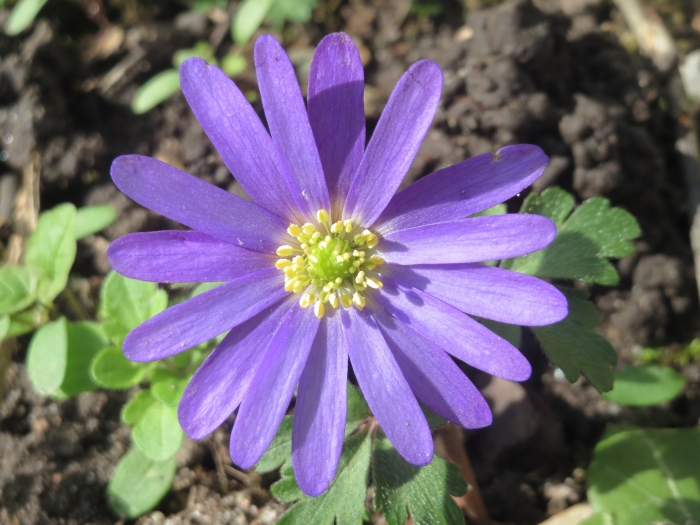Grecian Windflower
(Anemone blanda)
Grecian Windflower (Anemone blanda)
/
/

Andreas Rockstein
CC BY-SA 4.0
Image By:
Andreas Rockstein
Recorded By:
Copyright:
CC BY-SA 4.0
Copyright Notice:
Photo by: Andreas Rockstein | License Type: CC BY-SA 4.0 | License URL: http://creativecommons.org/licenses/by-sa/4.0/ | Rights Holder: Andreas Rockstein | Publisher: iNaturalist | Date Created: 2017-03-23T13:37-07:00 |















































Estimated Native Range
Summary
Anemone blanda, commonly known as Grecian Windflower, is a deciduous perennial herb native to open woodlands and scrubby areas in the Eastern Mediterranean region, including Greece and Turkey. It typically grows to a modest height of 10–15 cm (4–6 in) and is cherished for its early spring blooms and fernlike foliage, which provide color when few other plants are flowering. The Grecian Windflower’s daisy-like flowers are particularly striking, with intense purple-blue, pink, or white hues, and a cup-shaped form featuring numerous stamens and about seven or more sepals and petals. The foliage is finely divided, with leaves arranged in a whorled and alternate pattern, adding to its ornamental value.
Grecian Windflower is appreciated for its ability to naturalize and rapidly colonize favored locations, making it an excellent choice for underplanting deciduous trees, which mimic its native habitat by providing shade and the dry summer soil it prefers. It is also used in rock gardens, borders, and woodland gardens. The plant’s flowers are not only visually appealing but also attract bees, butterflies, and other pollinators, enhancing biodiversity in the garden. Cultivation requires planting in the autumn in partial shade to full sun, provided the soil remains moist. It thrives in well-drained soil that dries out in summer. The cultivar ’White Splendour’ has been awarded the Royal Horticultural Society’s Award of Garden Merit, indicating its exceptional performance in gardens. While generally easy to maintain, Anemone blanda can be susceptible to leaf spot and rust diseases, and in some conditions, it may spread more than desired, potentially becoming invasive.CC BY-SA 4.0
Grecian Windflower is appreciated for its ability to naturalize and rapidly colonize favored locations, making it an excellent choice for underplanting deciduous trees, which mimic its native habitat by providing shade and the dry summer soil it prefers. It is also used in rock gardens, borders, and woodland gardens. The plant’s flowers are not only visually appealing but also attract bees, butterflies, and other pollinators, enhancing biodiversity in the garden. Cultivation requires planting in the autumn in partial shade to full sun, provided the soil remains moist. It thrives in well-drained soil that dries out in summer. The cultivar ’White Splendour’ has been awarded the Royal Horticultural Society’s Award of Garden Merit, indicating its exceptional performance in gardens. While generally easy to maintain, Anemone blanda can be susceptible to leaf spot and rust diseases, and in some conditions, it may spread more than desired, potentially becoming invasive.CC BY-SA 4.0
Plant Description
- Plant Type: Herb
- Height: 0.5-0.8 feet
- Width: 0.3-0.5 feet
- Growth Rate: Moderate
- Flower Color: Blue, Purple, White
- Flowering Season: Spring
- Leaf Retention: Deciduous
Growth Requirements
- Sun: Full Sun, Part Shade
- Water: Medium
- Drainage: Medium, Fast
Common Uses
Bank Stabilization, Bee Garden, Bird Garden, Border Plant, Butterfly Garden, Deer Resistant, Drought Tolerant, Groundcover, Low Maintenance, Potted Plant, Rabbit Resistant, Rock Garden, Showy Flowers
Natural Habitat
Open woodlands and scrubby areas in the Eastern Mediterranean region
Other Names
Common Names: Greek Thimbleweed, Balkan Anemone, Winter Windflower, Balkan-Anemone, Balkan-Windröschen, Balkansymre, Oosterse Anemoon, Balkansippa, Strahlen-Anemone
Scientific Names: , Anemone blanda, Anemone apennina, Anemonoides blanda, Anemone apennina subsp. blanda,
GBIF Accepted Name: Anemone blanda Schott & Kotschy